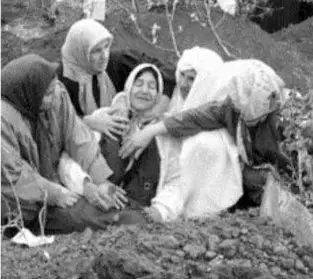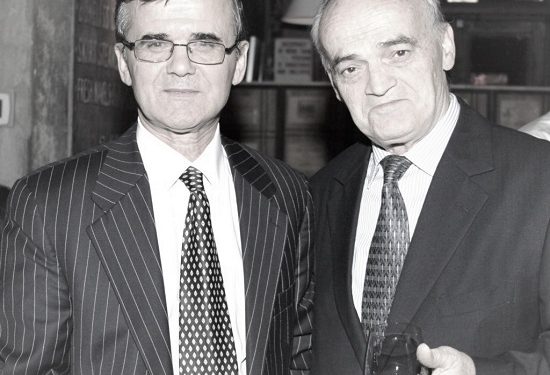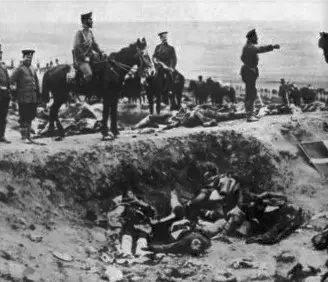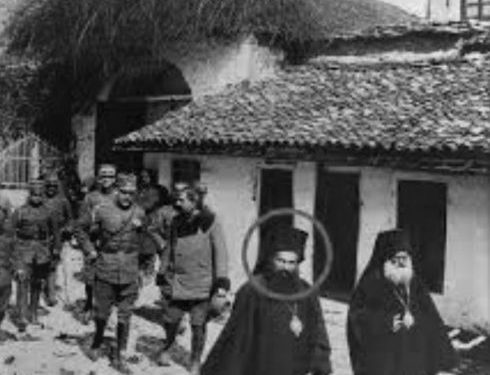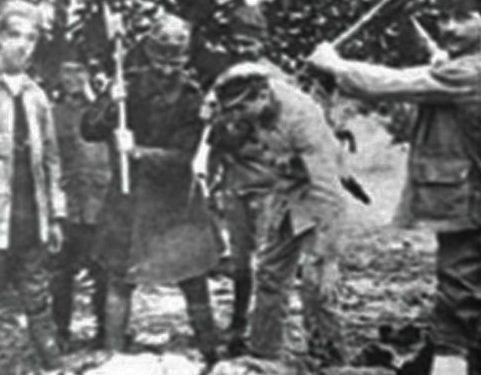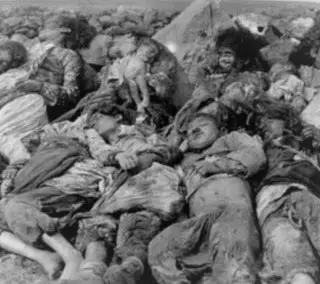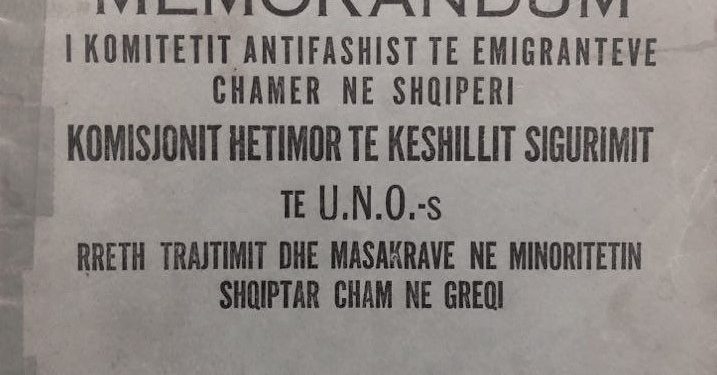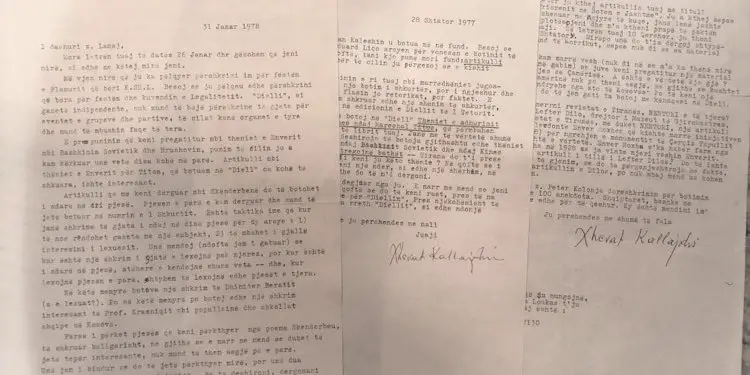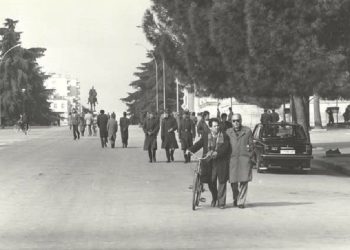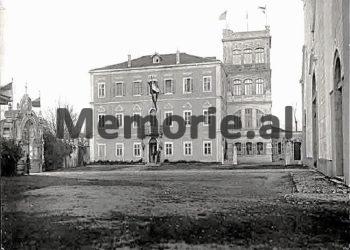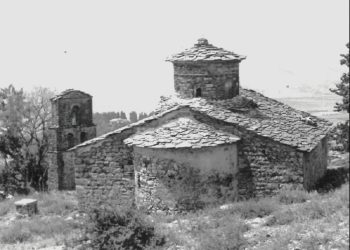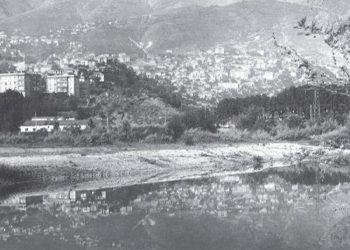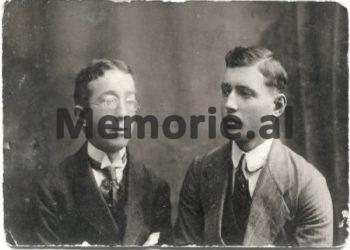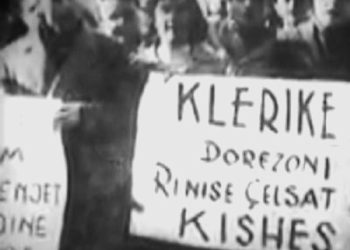By Dalip Greca
– EVIDENCE OF THE GREEK MASSACRES IN CAMERA, IN THE MEMORANDUM OF 1947 –
Memorie.al / Scholar Idriz Lamaj, author of hundreds of articles, several historical books, monographs and original historical documents such as the books: “English documents on the Albanian-Montenegro conflict around Plava and Gucia 1879-1880)”, “Committee Albania e Lirë” , “Xhaferr Deva – In the light of his own letters and other revelations of Mergata”, “For the Hearth and Hearth” etc… remains a rich documentary archive, full of letters, correspondence of personalities who lived in Mergata of his time. A part of his rich library has been donated to “Vatra”, while also the emigration documentation files of a large part of the Albanian emigration that came to the USA through the mediation of the “Free Albania” Committee and the Church they are also organized in “Vatra”. Why did we make this entry that is not related to the article we are publishing?
The reason is that I asked my friend, Idriz Lamaj, to provide me with as many letters and documents as possible from the editors of “Dielli” with whom he has exchanged letters. Xhevat Kallajxhiu, the former editor of “Dielli” for 10 years (after retirement), is a figure with the dimensions of the renaissance, which attracted me a lot, and Lamaj and Tonin Mirakaj sent me some of the materials. In the “Dielli” of February 2021, the researcher Lamaj published the article “Xhevat Kallajxhiu-Editor of the ‘Dielli’ in difficult times”, based on Kallajxhiu’s correspondence with important personalities of Mergata. After writing, I asked Mr. Lamai copies of correspondence, with the aim of enriching the archive of “Vatra” for the researchers who come after us. Searching in progress he also found the article we are publishing today.
The article was written for the newspaper “Dielli” by order of the then editor, Xhevat Kallajxhiu, who asked Lamaj to write something about Çamëria. His request was made in December 1977. The article was written, but for political reasons of the time it was not published in “Dielli”. We have the full correspondence between Kallajxhi and Lamaj. I asked the researcher Lamaj: Why didn’t Kallajxhiu publish the article in “Dielli” 42 years ago? His answer: “In December 1977, Mr. Kalljaxhiu asked me to write something about Çamëria, letting me understand that it was not a very favorite topic for the feelings of “Vatra” towards the communist regime in Tirana and should be treated with care. I had sent him some notes for which I left him free to use them, according to the position he was in, Kallajxhiu wrote to me on January 6, 1978: “… the issue of the Albanian-Greek border conflict, I have closed and ‘will do more words. Therefore, even the notes that you sent me, I will save them to one side, I will not use them now…”!
Were you happy with the editor’s decision not to publish the material prepared by you? – I sincerely asked Idrizi.
Answer: Not at all. With Mr. Kalljaxhiu, I had rich friendship and correspondence; we understood each other very well and the political circumstances of the time….! When Idrizi forwarded the article to me, in addition to the exchange of letters with the editor at the time, he wrote to me: If you see that it has value for today, publish it, but highlight it please – The credit goes to Xhevat Kallajxhi, who commissioned it from me, but could not publish it due to of the political situation and the conflicts of the time. After reading it, dear reader of “Dielli”, judge me if I did well to publish it after 40 or so years or not. In my judgment, writing remains a strong testimony that does not age. Thanks to Xhevat Kallajxhiu, who ordered the article! Thank you Idriz Lamaj for being kind enough to save it and send it to “The Sun”!
***
THE EVIDENCE OF THE GREEK MASSACRES IN THE CHAMBER IN THE MEMORANDUM OF 1947
PREPARED BY: IDRIZ LAMAJ / “Dielli” Newspaper
Memorandum of the Anti-Fascist Committee of Cham immigrants in Albania:
– We, the Committee of Cham Emigrants in Albania, with faith in the democratic and humanitarian principles of the United Nations (U.N.O.), on behalf of the Cham emigrants in Albania, submit to the Commission of Inquiry, our lost rights, oppressions, persecutions and massacres that carried out by the Greeks to exterminate the Albanian minority in Greece. In continuation of our protests and requests to our major allies and the United Nations, we ask for justice as we submit: The Greek chauvinist regimes, for 32 years in a row, brutally violating every human principle, and not at all disregarding international treaties, have used against the Albanian minority in Greece a policy of extermination. Ever since the Greek occupation of Chameria on February 13, 1913, D. Janaq’s gang, pushed and supported by the country’s authorities, massacred 72 men from the province of Paramithi in the stream of Selani without the slightest reason.
These massacres were the beginning of the extermination of the Albanian minority and reveal the orientation that Greek policy took towards our population. The persecutions, the imprisonments, the exiles, the tortures, the lootings and the robberies, under the pretext of disarmament during the years 1914-1921, the terrorist activity of the committeemen, the provocation of Gjen Baria in 1921, all these show the reality of the miseries in which he was put our population at the time of the Greek occupation. Koska, Lopsi, Varfanji, Karbunari, Kardhiqi, Paramithija, Margelleçi, Arpica, Grykohori, etc., are some of the villages that have paid dearly for this terror. By 1922-23, the rulers of Greece decided to impose the migration of the Muslim element of Chameria in exchange for the Greeks of Asia Minor, considering them as Turks. This shameful act of the governors of Athens was met with our resistance and with the intervention of the League of Nations, which, ascertaining the Albanian nation of our population, rejected the decision of the Greek government.
But despite the intervention of the League of Nations and the solemn commitments made by the Greek government in Lausanne, on January 16, 1923, the Greeks still continued their policy of extermination. They used every means to make it difficult for the Albanian element to stay in Çameri, expropriated hundreds of families in 6,000 hectares of land without the slightest reward, such as in Dushk, Gumenicë, Kardhiq, Karbunar, etc. The government of Athens installed immigrants from Asia Minor in Chameri in order to populate it with Greeks and create the possibility of emigration of the Albanian autochthonous population. Entire families were forced to leave their homeland for Turkey, Albania, America and elsewhere, and villages like Petrovica, Shëndellia were completely abandoned by the Albanian inhabitants.
In these circumstances, we did not enjoy any national rights and even our mother tongue still hinders us; instead of the development of national culture and progress, fanaticism and ignorance were supported, instead of schools, religious clubs in the Arabic language were opened and subsidized. 95 percent of our population was still illiterate. The province of Chameria, a rich and prosperous country, was left behind without economic development, without traffic and in the hands of Greek usurers, hoarders: Koçoni, Pituljet, Kaflla, Zhulla, Ringa, etc., who impoverished and enslaved the whole country. In the war against fascism, and right at its conclusion, the bloody forces of Llaka si Suli, commanded by General Napoleon Zervas, treacherously attacked and massacred the Albanian Muslim inhabitants of Chameria. The massacres in Chameri are a flagrant violation of human principles and a shameful disregard for the principles and character of the allied anti-fascist struggle.
The massacres in Chameri, even during the German occupation, were carried out by the local authorities and their gangs, who received orders from Athens to eliminate the Albanian element in Greece. Here is a concrete fact; with the departure of the German forces from Filat, Theodhor Vito’s forces entered Filat. Thus such a benefit provided the Zerviste forces with the wings by giving them the opportunity to start terror and massacres in a wide style in all the provinces of Chameria. The forces of the 10th Division of the E.O.E.A., under the command of Colonel Vasil Kamaras and exactly those of the 16th regiment of this division led by the lawyer Stavropullos Balluni Zoto, criminals with a stamp, Pretezenjt, etc., on June 27, 1944, entered in the city of Paramithi.
Contrary to the promises given and the agreement made between Mufti Hasan Abdullaj on the one hand and Shapera with Dhespot of Paramithi on the other hand, as agents of Zervo, the most terrible massacres began. Vulnerable men, women and children were the target of the Greek monarcho-fascists. The number of those massacred in the city of Parathimia and its surroundings reaches 600 people. On July 20, 1944, the forces of the 40th regiment under the command of Agora entered Parga, where they massacred 52 men, women and children.
The forces of E.O.E.A., under the command of Theodhor Vito, Ilija Kaqo, Hristo Mavrudhi, Hristo Kaqo, Hari Dhiamanti, etc., after surrounding the city of Filati, on September 23, 1944, on Saturday morning, entered the city. On that day they also entered Spatre.
They looted and robbed all the families and everything they found. In the evening of the night of the 23rd, dawning on the 24th of September 44, the forces commanded by Kranjaj and others entered. Upon the arrival of these forces, the massacres began immediately, 47 men, women and children were massacred in Filat and 157 are counted massacred, killed and missing in Spatar, where a good part of them were gathered from other villages. All the young women and girls were dishonored by Zervo’s criminals.
A few days later the Greek criminals rounded up all the remaining men, and with the decision of the fake cuckoo: Kocinja the Chairman, Stavropoulos the Prosecutor and four members, 47 innocent Albanians were massacred. The corpses of the 46 people killed and stabbed with knives and 45 others, in the field of Filati, in the field of Xhelo Meto…
Entire families have disappeared with parents, children and babies in cradles. Women and girls were dishonored. Hundreds of accounts from survivors describe the killings and suffering that followed. From them, the criminality and purpose of criminal actions in Çameri clearly emerges. Here are some examples: Sanie Bollati, in Paramithi, was burned with gasoline after cutting off your udders and having her eyes gouged out. Ymer Murat, they killed and dismembered him in Paramithi. More than 40 women had gathered in Sulo Tar’s house, and Çili Popova (from Popova), dressed as a soldier with a group of soldiers, entered, took the most beautiful women and girls and began to dishonor them in another room. The screams of girls and women reached their peak. This humiliation continued all night. Seri Fejzo, Fizret Sulo Tare, etc., were the object of these indignities.
Hilmi Beqirin from Filati, after they wounded him in front of his family, they left him and ran away. The family, to ensure him, shelters him at the dentist Mavrudhiu, he keeps him for a few hours, but later announces that they will take him and take him to Stavro Muhaxhiri, while he himself leaves for Shuaip Metja, where many families have gathered. The Andarts are informed, they take him, first he took out the gold teeth with a chisel and then they killed him. Malo Muho, an 80-year-old man who has been sick for four years, is stabbed to death in front of his wife. The brains fell into the lap of his wife, who, after collecting them, covered them with a quilt and ran away. In Spatar, Abdyl Nurqe is taken, taken to Filat barefoot, dragged through the streets of the city, and finally killed in front of Nidh Tafeqi’s house.
The family of Lile Rustemi from Sullashi, consisting of 16 people, most of them children, completely disappears without saving a single one.
Jalal Minit from Paramithija, beheaded with bayonets on the body of Mufti Hasan Abdullah. Sali Muhedini, Abedin Bakos, Muhamet Pronjes and Malo Sejdiut, your fingers, nose, tongue and feet are waiting for you. And, when these howl in great pain, the Zerviste Andarts, sing the song of their Commander, and delight in watching these horrors. Finally they were hanged on the butcher’s hook. Eshref Himi, a citizen of Paramithi, states the following about the massacres in Paramithi:
“On Tuesday, June 27, 1944, at 7 o’clock in the morning, the Greek army commanded by Colonel Kamara, Major Kranja, Captain lawyer Nikola Çenos, etc. entered Paramithi. As soon as they entered the city, the order was given that no one should move from the place because honor, freedom and wealth would not be affected in any way. After lunch, arrests began immediately among women, men and children, and on the other hand, theft began. All the men by the next day were killed. After they kept me in prison for four days, continues Eshrefi, they left me free to bury the murdered. In the place called Father George’s Church, I was able to recognize five of the murdered persons, the others had become unknown due to the torture they had suffered. The 5 victims known to me are: Met Qere, Sami Asim, Mahmut Kupi, Adem Beqiri and Haki Mile.
After two days, with a knife behind “Galatai” near the house of Dhimitër Nikollas, where they had killed 8 people. I couldn’t recognize them as they were in pieces. Human corpses were seen everywhere. Her name, Sanije Bollati, after suffering terrible torture, was burned alive with gasoline. This tragedy happened on Wednesday morning.” Eshref Himit’s testimonies are terrible and continue one after the other. He ends up in prison: “I found 380 people in prison, including women and children. 120 of these died of starvation. 4 people and I stayed in prison for 15 days and then they sent us to Preveza, from where we went to Ioannina and stayed for 40 days. There we suffered unexpected torture”
Dervish Sulo from the Spatar village of Filati describes the massacres in Spatar in this way: “On the morning of a Saturday in September 1944, the entire population gathered in front of the Spatar village mosque. The soldiers started robbing and dishonoring women, girls and even old women. Paçe Çulani, 50 years old, was dishonored, her hair was cut from her ears and finally she was killed in her garden near Muço. In our house, the family of Sako Banushi from Skropojna, consisting of eight people, women, men and children, was installed. After dishonoring the women, whose breasts were pierced with knives, they were all slaughtered.
“In Dam Muhameti’s house, 5 women and three children were killed. In the house of Fetin Muhameti, Hane Isufi was tortured and then dishonored, along with another woman. At Dule Sherif’s house, the 80-year-old Sulejman Dhimica and his wife were beheaded. In Meta Braho’s house, 20 people, women, children and men, were burned alive. Kije Nurcia, 76 years old, was stabbed. In Zule’s vineyard and Avdyl Nurçe’s garden, I saw 30 people massacred. In Haxhi Latif’s house, Havaja, Ajsja and Nazo Arapi were dishonored, and then the latter was massacred”!
The victims and losses according to statistics so far, during the massacres of Albanians in Greece in the period 1944-1945, reach the number of 2,877, divided as follows: Filati and districts 1,286, Gumenica and districts 192, Paramithi and districts 673, and Magelliç and Perg 626. This was the fate of all those who could not leave Çameria, with the exception of some women who are still living witnesses of this horrifying massacre in Paramithi, Perg, Spatar and Filat. The genocide of the Greeks against the Albanians in Çameri comes out clearly from their mouths.
This massacre inspired by the lowest feelings of chauvinistic and religious hatred ended in the forced displacement of nearly 23,000 Chams, who took refuge in Albania in terrible conditions. 68 villages with 5,800 houses were looted, destroyed and burned. From the damage calculation, it appears that 17,000 small cattle, 1,200 fat, 21,000 kv of bereq and 80,000 kv of cattle were robbed in Çameri by the fascist forces of Zerva. Oil, also the production of the year 1944-1945, which amounts to 11,000,000, kg. and 3,000,000 kg. oil.
During the emigration, 110,000 small cattle and 2,400 large cattle died and were lost. It is clearly seen the great economic catastrophe that our population suffered by being left on the immigration roads with only the clothes of the body. In support of this ascertained situation, the UNRRA Mission in Albania had the approval from the center of Washington for the allocation in favor of immigrants, 1,450,000 dollars as immediate help to our difficult situation”. A paragraph of the said memorandum ends….!
***
THE AUGUST PROVOCATION
The propaganda of the communist regime of Tirana has written for a long time about the August Provocation of 1949, giving a completely camouflaged motive of the reality of the historical events of that time that, of course, the Albanian people paid dearly for. From 1945 to 1949, the new communist regime in Albania, led in every field by the Yugoslavs, supported the communist movement in Greece to seize power.
Of course, the arming and handling of the Greek communist forces on the territory of the Albanian state was kept secret and directed by the Yugoslavs. The conflicts between Bulgaria and Yugoslavia, regarding the leadership of the Balkan Communist Federation or Confederation (in which Greece was supposed to be included), and several other factors, lead to American political intervention in saving Greece from falling under the communist regime; which immediately caused the Soviet intervention in the Balkans, and resulted in the “breakdown of Yugoslav-Albanian relations”, due to their inability to implement the Soviet plans to expand the territorial conquest of the Balkans.
Now let’s go back to the PROVOCATION OF AUGUST 1949, according to the Memorandum of the Anti-Fascist Committee of Çamër Emigrants in Albania, published in Tirana in 1947, and reprinted by the Çamëria Society in Hartford, Connecticut, USA. B.A., in 1949:
– On August 2, 1949, regular Greek army forces consisting of 3 battalions, reinforced with artillery and 15 bomber planes, attacked Albanian land, in the Bozhigrad sector, on a front of 700-800 meters wide. The border guards of the Albanian army made a heroic stand, launched a counterattack, expelled the Greek army and restored the situation. In the fighting of August 2, in defense of the homeland, captain Memo Nexhipi from Dukajt e Tepelena, aspirant Ferid Bresari, from Vendresha e Skrapari and 4 border guard soldiers remained on the battlefield.
On August 3, 4 and 5, the Greek army in regular infantry, artillery and aviation units carried out provocations in the sector of Bozhigrad, Leskovik and Saranda. In the battles that took place, 12 Greek soldiers were killed on Albanian soil, 2 officers were captured and 2 planes were shot down by Albanian artillery, one in the Bozhigrad sector and the other in Saranda. In this case, the pilot Panajot Bellafis, with the rank of lieutenant colonel, was captured alive. On August 12, at 3:00 a.m., Greek forces, supported by artillery and aircraft, attacked the Bilishti sector. At 1:00 p.m. of the same day, a brigade of the Greek army supported by artillery and 6 airplanes attacked the Albanian land, towards primada 32-34, in the sector of Bilishti. In both of these cases, the Albanian forces stood bravely and drove them out of the border, causing heavy losses to the Greek army.
On August 13, from the defeats suffered before, two brigades of the Greek army, supported by heavy artillery, attacked furiously crossing the border in the sector of Bilishti, but the Albanian forces, well concentrated in their positions, broke them and put them to flight leaving 26 soldiers dead. The next day, August 14, the 41st Brigade of the 9th Division of the Greek army, having at their disposal artillery and a squadron of airplanes, rushed again to Bilishti from all sides. The Albanian army not only withstood the attack successfully, but jumped on the enemy’s trenches: the Greek army retreated leaving 60 dead and many wounded. Here, not only the regular Albanian army, but also the common people, determined to the death in defense of the Motherland, showed a heroic resistance in the defense of quota 1309, and broke the attacks of the Greek battalions.
The other days, in the sector of Llapanica, in the Posta e Guri, or in Trestenik and other places, fierce fighting took place. Tafil Ferati, Muharrem Veizi, Myftar Shato Leskaj, Nasi Remarçka, etc., fought neck to neck and remained in the enemy’s trenches. These devout patriots, and many like them, paid with their blood for Enver Hoxha’s political adventures, and showed the Greek enemy that the border of today’s Albanian state cannot be crossed without blood.
From the 2nd of August to 12 o’clock on the 15th of August, the Albanian forces inflicted more than 300 dead and hundreds of wounded on the Greek invading forces. We have taken these data with reserve from the official press of Albania: “Voice of the People”, 4,7,14, August 16, 1949; “Warrior”, September 18 and 22, 1949; Communication of ATSH, in “Zëri i Populli”, August 6, 1949; Operational communication of the Ministry of the Armed Forces of RPSH, August 7, 1949. I also made a quick comparison in the data of the studies ‘MILITARY REPORT ON ALBANIA’, of that period. When dealing with these battles that undoubtedly caused Albania great material damage and human losses, special precision and care is needed.
***
The editor’s note of ‘The Sun’ (June 16, 1978, pg. 7) says more correctly: "… the entry of Greek armies into Albanian lands in 1949 was caused by the crazy action of the Tirana regime, which helped the communist factions Greek and had made Albania a center of shelter and training for them”. Here we should not doubt at all that, if the Greek military forces were not defeated by the Albanian forces, they (the Greeks) would annex South Albania. From several United Nations documents, it can be seen that Greece, under the pretext of suppressing the Greek communist rebel forces, aimed to realize the old chauvinist dream of ‘Vorio Epirus’.
Also, it is verified with a dozen archival documents, the quick intervention of the American government near the King of Greece, to end the conflict with Albania. We have passed through many articles in which it is clear that the American government has never paid attention to the slander, propaganda, nor the depraved and vile attacks of Enver Hoxha and his dictatorial regime. But, before and after August 1949, the United States of America put strong pressure on every threat that was conjured up to the Albanian state, and in every diplomatic activity, they defended the territorial integrity of today’s Albania.
Those who argue about the bitter past, better look at the present tragic episode of friendly relations between the Stalinist regime of Albania and imperialist Greece. The official press of Greece and its diplomats from time to time, shed tears like pus squeezing for the persecutions of the microscopic Greek minority in Albania. Enver Hoxha, with shame, humbles himself today in front of Athens, just as he humbled himself in front of Belgrade and Moscow, and with his mouth affirms the lie when he says: “… the Greek minority in Albania has experienced many difficult days and years”. Comrade Enver, let him ask his friends in Athens, what days and years did the Albanians experience and are experiencing in Greece?/Memorie.al
….Albanian people will never forget: CHAMBER MASSACRED BY THE GREEKS (Idriz Lamaj)
December, 1977




